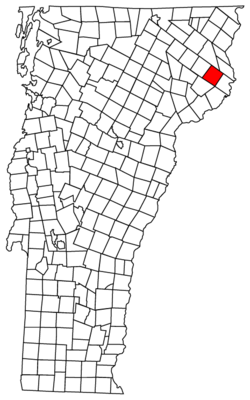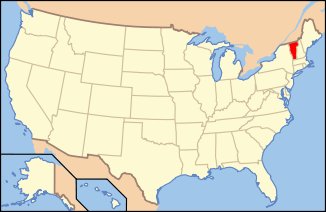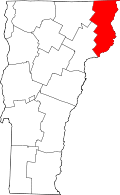Granby, Vermont
| Granby, Vermont | |
|---|---|
| Town | |
 Located in Essex County, Vermont | |
 Location of Vermont with the U.S.A. | |
| Coordinates: 44°36′45″N 71°42′55″W / 44.61250°N 71.71528°WCoordinates: 44°36′45″N 71°42′55″W / 44.61250°N 71.71528°W | |
| Country | United States |
| State | Vermont |
| County | Essex |
| Area | |
| • Total | 39.1 sq mi (101.2 km2) |
| • Land | 39.0 sq mi (101.1 km2) |
| • Water | 0.1 sq mi (0.1 km2) |
| Elevation | 1,808 ft (551 m) |
| Population (2010) | |
| • Total | 88 |
| • Density | 2.3/sq mi (0.87/km2) |
| • Households | 43 |
| • Families | 28 |
| Time zone | EST (UTC-5) |
| • Summer (DST) | EDT (UTC-4) |
| ZIP code | 05840 |
| Area code(s) | 802 |
| FIPS code | 50-29125[1] |
| GNIS feature ID | 1462106[2] |
Granby is a town in Essex County, Vermont, United States. The town was named for the Marquis of Granby.[3] The population was 88 at the 2010 census.[4] Granby is part of the Berlin, NH–VT Micropolitan Statistical Area. Granby was one of the last two towns in Vermont to be linked to the electric grid, in 1963. [5]
Geography
According to the United States Census Bureau, the town has a total area of 39.1 square miles (101.2 km2), of which 39.0 square miles (101.1 km2) is land and 0.1 square mile (0.1 km2) (0.13%) is water.
Demographics
| Historical population | |||
|---|---|---|---|
| Census | Pop. | %± | |
| 1800 | 69 | — | |
| 1810 | 120 | 73.9% | |
| 1820 | 49 | −59.2% | |
| 1830 | 97 | 98.0% | |
| 1840 | 105 | 8.2% | |
| 1850 | 127 | 21.0% | |
| 1860 | 132 | 3.9% | |
| 1870 | 174 | 31.8% | |
| 1880 | 194 | 11.5% | |
| 1890 | 361 | 86.1% | |
| 1900 | 182 | −49.6% | |
| 1910 | 95 | −47.8% | |
| 1920 | 70 | −26.3% | |
| 1930 | 69 | −1.4% | |
| 1940 | 76 | 10.1% | |
| 1950 | 74 | −2.6% | |
| 1960 | 56 | −24.3% | |
| 1970 | 52 | −7.1% | |
| 1980 | 70 | 34.6% | |
| 1990 | 85 | 21.4% | |
| 2000 | 86 | 1.2% | |
| 2010 | 88 | 2.3% | |
| Est. 2014 | 85 | [6] | −3.4% |
| U.S. Decennial Census[7] | |||
As of the census[1] of 2000, there were 86 people, 33 households, and 26 families residing in the town. The population density was 2.2 people per square mile (0.9/km2). There were 78 housing units at an average density of 2.0 per square mile (0.8/km2). The racial makeup of the town was 98.84% White, and 1.16% from two or more races. 32.3% were of English, 19.4% French, 16.1% Scottish, 9.7% French Canadian, 9.7% Irish, 6.5% Finnish and 6.5% Swedish ancestry according to Census 2000.
There were 33 households out of which 33.3% had children under the age of 18 living with them, 72.7% were married couples living together, 3.0% had a female householder with no husband present, and 18.2% were non-families. 12.1% of all households were made up of individuals and 6.1% had someone living alone who was 65 years of age or older. The average household size was 2.61 and the average family size was 2.89.
In the town the population was spread out with 24.4% under the age of 18, 5.8% from 18 to 24, 29.1% from 25 to 44, 26.7% from 45 to 64, and 14.0% who were 65 years of age or older. The median age was 42 years. For every 100 females there were 87.0 males. For every 100 females age 18 and over, there were 97.0 males.
The median income for a household in the town was $39,375, and the median income for a family was $39,375. Males had a median income of $31,250 versus $18,750 for females. The per capita income for the town was $30,343. None of the population or families were below the poverty line.
References
- 1 2 "American FactFinder". United States Census Bureau. Retrieved 2008-01-31.
- ↑ "US Board on Geographic Names". United States Geological Survey. 2007-10-25. Retrieved 2008-01-31.
- ↑ "Profile for Granby, Vermont". ePodunk. Retrieved 2010-05-09.
- ↑ "Profile of General Population and Housing Characteristics: 2010 Demographic Profile Data (DP-1): Granby town, Essex County, Vermont". U.S. Census Bureau, American Factfinder. Retrieved February 3, 2012.
- ↑ Vermont Public Service Department (1998), "Comprehensive Energy Plan", State of Vermont, p. 23 http://publicservice.vermont.gov/publications/energy_plan/1998_plan, retrieved April 24, 2014 Missing or empty
|title=(help) - ↑ "Annual Estimates of the Resident Population for Incorporated Places: April 1, 2010 to July 1, 2014". Retrieved June 4, 2015.
- ↑ "U.S. Decennial Census". United States Census Bureau. Retrieved May 16, 2015.
